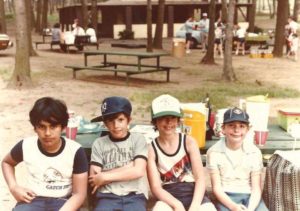Long ago, before I had read the word “sociopath” in some now outdated psychology text book, I met Joe* (*not his real name). Joe introduced himself to me by kicking me in the ass, repeatedly, while we walked home from school. I was eight, and my parents and I had just bought our first house, a ranch-style two-bedroom one-and-a-half bath in Parlin, NJ. It wasn’t my first day at that particular school, but it was the first time I walked home afterwards, rather than being bussed to the apartment complex we’d previously inhabited.
Joe was walking with a kid I didn’t recognize, nailing my buttock with his sneaker to a cadence that any boot camp instructor would have approved of. When I finally turned around to confront him, we somehow got to talking, and realized we lived on the same street and that we both liked Star Wars. Joe was my first best friend. I knew this because he told me so a few weeks later. By then, we’d started playing over at each other’s houses, as well as those parts of Parlin easily accessible to a couple of boys with bicycles.
Joe was my first experience with deliberate, willful lying, simply for its own sake, as if it were not a sin or a crime, but rather, a way of life. He lied about the most inconsequential things. Joe cheated at every game we played, and if I managed to win, he would explain to me why I’d still lost. To me it didn’t matter. I was just thrilled to have a best friend. We also used to play make-believe type games, which I enjoyed the most, as I got a thrill out of inhabiting a character, whether it be a starship engineer (Joe was always captain,) a cowboy, a gangster, or a Jedi Knight. It was during one of these games that Joe got me using the word “nigger.” To this day, I do not know if Joe knew the actual meaning behind that word, but he’d convinced me that niggers were cute little creatures that spoke in cartoonishly high voices and became embroiled in various hijinks. We played that game for several years until, overhearing us as we ran around their backyard, Joe’s father admonished us that it was a cuss word denigrating black people, and that we were to cease using it immediately. His father was one of the few people, in fact the only one that I can recall, that Joe truly feared.
Joe had an adorable mutt named Barney. He was something like a long-haired terrier with the saddest eyes I’d seen on any animal. One day, while playing with Barney in the kitchen, Joe got him to leap up on his hind legs, and proceeded to “dance” with him, far too roughly and far too quickly. Suddenly, Joe gave Barney a backwards push, and an audible snap echoed in the small kitchen, followed by piteous howls. When Joe tried to calm Barney, the dog bit him. I felt horrified and confused as we watched Barney roll side-to-side. When Joe’s mother got home from some errand, she was furious. Barney had snapped both of his hind legs. Joe described the incident, and complained that Barney had bit him. What stands out in my memory, beyond poor Barney’s obvious suffering, is the expression on Joe’s face as his mother bundled the pooch up in a blanket and headed out to the car. Utter fascination. I had witnessed him scooping goldfish out of the pond in their backyard and smashing them flat with bricks, but in hindsight, I can see that this was a pivotal moment in which Joe became cognizant of his power over larger animals.
Another of Joe’s favorite pastimes was playing with his magnifying glass. He liked lighting dry leaves and twigs on fire, then quickly stamping them out. He enjoyed frying ants and beetles under the glass’s focused beam even more. I was just as guilty. Joe insisted that I cook bugs with his magnifier, so I did. I don’t recall feeling guilty about it; it was just something we did. Joe’s lure, capture, and torture of cats, however, wasn’t something I could get myself to join in. I told him I was afraid of them (and I was, actually) and he called me chickenshit and chuckled about it. By this point in our relationship, I had begun to realize I was in a kind of trap. His escalating cruelty frightened me, but the idea of walking away from our friendship, or telling somebody, an adult perhaps, completely terrified me. I didn’t like to contemplate what Joe would do to me if I tried to break away from him.
By this point, I was eleven years old, and three long years had deposited me in a place I could never escape from — never would have ebscaped from, had my father not gotten a substantial promotion and salary hike at work. My parents informed me that we were going to buy a new house, a house nobody had ever lived in before, in another town. However hard I try, I cannot recall Joe’s reaction to this news. Perhaps it is something I have blocked out.
In 1983, we moved to East Brunswick. Though Joe and I kept in touch by phone, gradually, his hold over me lessened and disappeared. There was no great moment of relief, no joy. My friendship with Joe had left me permanently weird inside, and at my new school, other kids could sense that strangeness in me. Those who didn’t avoid and ignore me generally bullied me. Looking back, however, armed now with the knowledge of a man in middle age, I know that my father’s promotion saved me, saved some integral part of who I essentially was and would become.

